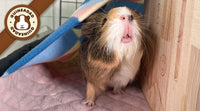Hibernation is a mysterious behavior seen in a wide variety of species, some of which are rodents. Since our cavie companions fall into the rodent category, it is reasonable to wonder whether or not they have a tendency to hibernate.
Knowing the difference between naturally occurring behaviors that can persist in captivity and abnormal behaviors is all part of good pet parenting. Let’s look into the lives and legacies of Guinea Pigs to determine where they fall when it comes to hibernation.
What is Hibernation?
Hibernation is an energy conservation strategy that some species have evolved to cope with periods of unfavorable weather, insufficient resources, or other survival challenges. Hibernation is a form of dormancy where animals experience a significantly reduced metabolism, a reduced heart rate, and a reduced body temperature.
This dormancy state may persist for an entire season or longer and true hibernating species will come out of this state thinner but generally unharmed. Some species increase their fat stores to survive this long stretch of inactivity, while others store stashes of food to access as needed. The survival of these species is the result of years of evolution, and species that have not evolved to hibernate would not survive the physiological changes that come with hibernation.

Do Guinea Pigs Hibernate?
The short answer is no, Guinea Pigs do not hibernate. Years of domestication and genetic ties to wild relatives in warm climates mean Guinea Pigs did not need to evolve to hibernate for survival.
Scientific studies regarding hibernation often use Guinea Pigs as a non-hibernating control rodent species while hibernating rodents, like squirrels, are studied. These studies tend to find significant differences in physical functions between hibernators and Guinea Pigs, like a resilience to circulatory arrest in the hibernating species when there is a drop in body temperature. These differences prove Guinea Pigs were not built for hibernation on a genetic level.
The burrowing and hiding nature of this species may lead people to believe Guinea Pigs have a tendency to go dormant, but that is not the case. These small defenseless rodents simply love having a place to hide, just like their wild relatives in South America.
If a Guinea Pig is fearful or stressed they may hide until the triggering stimuli pass, but this is more of a retreat than a period of dormancy. It is also worth noting that healthy comfortable Guinea Pigs are normally active for about 20 hours a day and are highly social, so long spells of inactivity are abnormal.

Why Is My Guinea Pig Not Active?
If you have noticed that your Guinea Pig is not participating in normal behaviors and is spending most of their time hidden away, something may be wrong. Fear, discomfort, injuries, illness, and unfavorable social structures could all cause your Cavie to act less active.
Since Guinea Pigs do not hibernate, any abnormal drop in activity should not be dismissed. Pay attention to make sure all of your Guinea Pig’s needs are met and seek the help of a vet if their behaviors become abnormal. Decreased appetite, inactivity, a drop in body temperature, and decreased defecation may be signs of hibernation in some species but in Guinea Pigs, they are reasons for concern.
If you want to learn more about Guinea Pig behaviors, check out our other blogs below:









5 comments